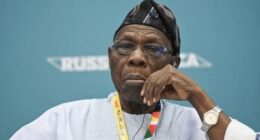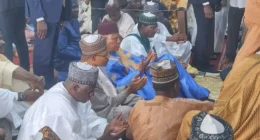
A military tradition designed to maintain hierarchy has resulted in the compulsory retirement of an estimated 500 to 900 senior military officers across the Army, Navy, and Air Force between 2015 and 2023. These mass disengagements, affecting Major-Generals, Brigadier-Generals, Rear Admirals, and Air Vice Marshals, are triggered whenever a new Service Chief is appointed, forcing officers senior to or of the same course as the new chief to retire.
This practice, intended to ensure discipline and operational efficiency, has led to a major loss of experienced personnel under the administrations of former President Muhammadu Buhari and his successor, President Bola Tinubu.
Cycles of Forced Retirement
Under President Buhari, three major waves of retirement were recorded:
2015 Appointments: Over 100 senior Army officers and more than 20 senior Naval officers were retired following the appointment of Lt.-Gen. Tukur Buratai, Air Marshal Sadique Abubakar, and Vice Admiral Ibok-Ete Ibas.
2021 Appointments: The replacement of all Service Chiefs saw approximately 123 Generals leave the Army, alongside over 50 senior Air Force officers and 50 Naval officers.
Post-Attahiru: Following the death of Lt.-Gen. Ibrahim Attahiru in May 2021, the appointment of Gen. Farouk Yahaya triggered the retirement of more than 20 Generals who were his seniors.
The trend has continued under President Tinubu. The June 2023 appointments of the new Service Chiefs resulted in the compulsory retirement of 51 Army Generals, 49 Air Force officers, and 17 Naval officers. The latest shake-up announced last Friday is expected to trigger another round of retirements, potentially affecting about 60 additional top officers.
The Debate: Tradition vs. Waste
The recurring cycle of disengagement has drawn sharp criticism from military analysts and retired officers, who are divided on whether the practice is necessary or structurally flawed.
Calls for Reform and Legislative Oversight
Retired General Ishola Williams strongly criticized the practice, calling it a reflection of the “culture of the military regime.” He argued that the abrupt dismissal of senior officers is “abnormal” and suggested a structural change where the Chief of Defence Staff acts as the principal staff officer to the President, instituting a natural order of succession.
Retired Group Captain Sadique Shehu, who served on a reform committee under Buhari, described the gale of retirements as “unsustainable” and “structurally flawed.” He attributed the issue primarily to poor manpower planning, political interference, and rank inflation.
Shehu revealed that as of 2022, the Nigerian Armed Forces, with a total strength of 235,000 personnel, had about 960 generals, nearly the same number as the United States military, which has 1.3 million personnel.
“The first solution is to tighten the number of generals we are producing. If we do that, even when the President exercises his power to appoint a service chief from a lower course, fewer officers will be affected.”
Shehu urged the National Assembly to exercise stronger oversight by legislating clear conditions for the appointment and tenure of Service Chiefs to curb the cycle of forced disengagements.
The Role of ‘Cabals’
Retired General Aliyu Momoh commended President Tinubu’s initiative but urged him to go deeper by removing the “cabals, the cartels” that he claims control the military establishment, irrespective of whether they are politicians or ex-generals. Momoh contended that without addressing these underlying influences, the changes will be ineffective.
Defence of Military Tradition
Other senior retired officers defended the tradition as a necessary and unavoidable aspect of military life.
Retired General PJO Bojie described the mass retirement as a “routine” and “normal” exercise that is “in line with military tradition.”
Brigadier General Adewinbi (retd.) called it an “established military tradition that could not easily be changed” but suggested the government should explore ways to continue benefiting from the experience of retired generals by enlisting them in the country’s reserves.
Major General Lasisi Abidoye (retd.) argued that routine retirement is healthy for the military, preventing stagnation among junior officers. He also stressed that no Service Chief should stay longer than two to three years, as anything beyond that becomes “counterproductive.”








